Although I despise the perversions and violence against women that pornography embodies, and I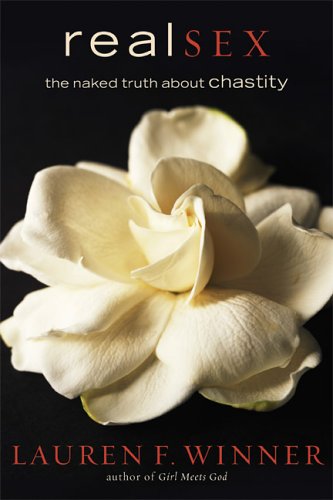 have no interest in finding anything redemptive about the Fifty Shades books and movie, I have been asked by a few customers to write about sexuality, or at least to write about books about sexuality. We’ve done that before, and we have a wide and hearty selection here at the shop, from a wide spectrum of views within the church universal. We still think Lauren Winner’s Real Sex: The Naked Truth About Chastity (Brazos Books; $14.99) is a must read. We just got in Damaged Goods: New Perspectives on Christian Purity by Dianna E. Anderson (Jericho Books; $18.00) a book that is complicated — I really, really appreciate much of it. She shows the troubling consequences and even weirdness of some of the evangelical fetish about sexual purity, what with the daddy daughter dances and sexual purity rings given to tweeners and tedious courtship rituals and gender assumptions and a whole ton of shame. But, I also think some of it seems pretty muddled, perhaps the proverbial pendulum swinging a bit in over-reaction… Of course, there are some progressive Christian feminists who are fairly conventional in
have no interest in finding anything redemptive about the Fifty Shades books and movie, I have been asked by a few customers to write about sexuality, or at least to write about books about sexuality. We’ve done that before, and we have a wide and hearty selection here at the shop, from a wide spectrum of views within the church universal. We still think Lauren Winner’s Real Sex: The Naked Truth About Chastity (Brazos Books; $14.99) is a must read. We just got in Damaged Goods: New Perspectives on Christian Purity by Dianna E. Anderson (Jericho Books; $18.00) a book that is complicated — I really, really appreciate much of it. She shows the troubling consequences and even weirdness of some of the evangelical fetish about sexual purity, what with the daddy daughter dances and sexual purity rings given to tweeners and tedious courtship rituals and gender assumptions and a whole ton of shame. But, I also think some of it seems pretty muddled, perhaps the proverbial pendulum swinging a bit in over-reaction… Of course, there are some progressive Christian feminists who are fairly conventional in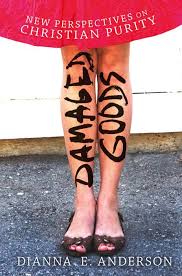 terms of normative Christian sexual ethics, so it certainly needn’t be a black and white binary in being either fundamentalist and misogynist or progressive and sexually healthy, even though any number of recent books by former evangelicals seem to have that caricatured and tone. Anyway, there are great books and fascinating books and candid books and, yes, some weird ones out there. I think Damaged Goods is worth reading carefully, even though most evangelicals will think she’s a bit too casual, now.
terms of normative Christian sexual ethics, so it certainly needn’t be a black and white binary in being either fundamentalist and misogynist or progressive and sexually healthy, even though any number of recent books by former evangelicals seem to have that caricatured and tone. Anyway, there are great books and fascinating books and candid books and, yes, some weird ones out there. I think Damaged Goods is worth reading carefully, even though most evangelicals will think she’s a bit too casual, now.
One of the things that comes up in this book, and others, is the matter of pleasure. Do conservative religious traditions set out to stamp out pleasure? That’s the real topic I’d like to tell you about, and I’ll (eventually) describe four books that approach this wonderfully. Three are brand new; one is older, but so very nice. I don’t know if this is some of what underlies the discussion about Shades of Grey… I am staying out of that for now, as so much ink has already been spilled. There have been fifty shades of reviews, and I haven’t read the books nor will I see the film, so I’m leaving it to other, wiser voices.
But I do gather that some religious folks are being portrayed as kill joys. We just stymie life’s pleasures, zapping enjoyment, resisting fun. Girls just want to have fun, after all; daddy is such a drag. Poor Lou Albano, who plays the clueless, uptight father in the classic video. When I hear that fun song by Cyndi Lauper — especially the all-acoustic one with a Caribbean rapper from The Body Electric — I almost believe it.
But no. There has been a large and robust tradition within the historic Christian tradition that does not hate the body, that does not hate the created order, that certainly does not court pain for its own good — those guys who beat themselves in the Middle Ages (or the guy in Orphan Black) have been
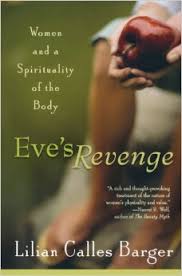 considered heterodox, mostly. Lilian Calles Barger, by the way, has written brilliantly as an evangelical feminist on this topic, and how weird views from church and culture have effected women’s lives, even women’s views of their own bodies. In her Eve’s Revenge: Women and a Spirituality of the Body [Brazos Press; $18.00) she studies this thoroughly, and offers a healthy and classic view, sane and good. Christian faith does value great joy, and good pleasures, even bodily pleasures. You know that C.S. Lewis line: “God must love matter. He made a lot of it.”
considered heterodox, mostly. Lilian Calles Barger, by the way, has written brilliantly as an evangelical feminist on this topic, and how weird views from church and culture have effected women’s lives, even women’s views of their own bodies. In her Eve’s Revenge: Women and a Spirituality of the Body [Brazos Press; $18.00) she studies this thoroughly, and offers a healthy and classic view, sane and good. Christian faith does value great joy, and good pleasures, even bodily pleasures. You know that C.S. Lewis line: “God must love matter. He made a lot of it.”
Last month in BookNotes, I celebrated Teach us To Want: Longing, Ambition and the Life of Faith by Jen Pollock Michel (IVP; $16.00) as one of our favorite books of 2014, naming it one of the best Books of the Year. It is a beautiful memoir-like reflection about ambition, bring one woman’s view, and it comes around to this question over and over. Is it wrong to want? Is desire necessarily suspect? It’s a fine place to start.
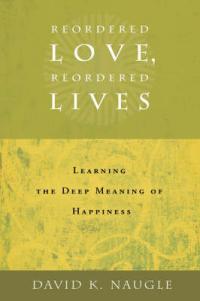
Along these very lines, we are going to host an evening on March 3rd here in Dallastown with a favorite author of ours, David Naugle, whose profound book Reordered Love, Reordered Lives: Learning the Deep Meaning of Happiness (Eerdmans; $18.00) is a wonderful, thoughtful rumination on the meaning of true happiness — which has to do with enjoying things in the right way. Not unlike Jamie Smith’s remarkable recent books (Desiring the Kingdom) there is stuff here about longing, desire, love. It’s about being happy, for crying out loud. The title, Reordered Love, is a great phrase, insightful, itself. We have to order our loves so that we learn to love the right stuff, the right way. We can’t wait to have him here, sharing with us about this book and how we can, indeed, have re-ordered loves and re-ordered lives. I bet he could tell us a thing or too about what’s really going on in the Fifty Shades fiasco.
Okay, sorry for that preamble.
I was just going to fire off four quick titles to whet your appetite. I’m packing books and boxes for the big Jubilee conference next week, so have to be quick. Here we go — four books to help us ponder pleasure, enjoying life’s beauties big and small, the right way, and finding ways to help us do that, and do it well.
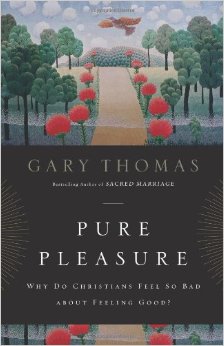 Pure Pleasure: Why Do Christians Feel So Bad about Feeling Good? Gary Thomas (Zondervan) $14.99 We write about Thomas from time to time here — in fact, we awarded him a “Book of the Year” award for a recent book he did on marriage, A Lifelong Love. We love his good books Sacred Marriage and Sacred Parenting and really appreciate his other books, like Glorious Pursuit about virtue, spiritual formation, and being — as one of his titles puts it — Holy Available to God. He “practices the presence of God” as they say, and has this delightful way of bringing deep stuff from the historic saints and older mystics into very upbeat, popular conversation. In the midst of this fairly heavy stuff about spirituality, spiritual disciplines, being transformed by the gospel and such, he found this other theme — some believers seem to have this peculiar guilt about pleasure. He’s a deeply spiritual guy but he’s lighthearted. He’s a joy to be around. Here in Pure Pleasure he offers the power of guilt-free pleasure. As it say on the back,
Pure Pleasure: Why Do Christians Feel So Bad about Feeling Good? Gary Thomas (Zondervan) $14.99 We write about Thomas from time to time here — in fact, we awarded him a “Book of the Year” award for a recent book he did on marriage, A Lifelong Love. We love his good books Sacred Marriage and Sacred Parenting and really appreciate his other books, like Glorious Pursuit about virtue, spiritual formation, and being — as one of his titles puts it — Holy Available to God. He “practices the presence of God” as they say, and has this delightful way of bringing deep stuff from the historic saints and older mystics into very upbeat, popular conversation. In the midst of this fairly heavy stuff about spirituality, spiritual disciplines, being transformed by the gospel and such, he found this other theme — some believers seem to have this peculiar guilt about pleasure. He’s a deeply spiritual guy but he’s lighthearted. He’s a joy to be around. Here in Pure Pleasure he offers the power of guilt-free pleasure. As it say on the back,
Pleasure is a good thing. It s a powerful force that feeds your relationships, helps protect your spiritual integrity, and brings delight to our heavenly Father. Pleasure isn t something Christians should fear, shun, or disparage; it s something we should learn to cultivate in our lives. Acclaimed spiritual growth author Gary Thomas will guide you into this way of life, which is foundational to a healthy relationship with God, with your loved ones, and with the world. He ll show you that, for the redeemed, pleasure can be a powerful and holy force for good, leading to increased worship, spiritual strength, and renewed relationships. In this invigorating and liberating book, Gary Thomas will energize, inspire, equip, and challenge you to experience life as God meant it to be: overflowing with pleasure.
I think Mr. Thomas is really on to something here, and I enjoy his writing a lot. See what I did there? Have fun: read about pleasure! That’s a win, win.
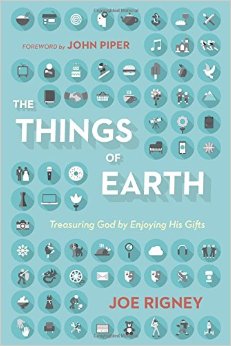 The Things of Earth: Treasuring God By Enjoying His Gifts Joe Rigney (Crossway) $16.99 Rigney is a professor of theology and Christian worldview at Bethlehem College and Seminary in Minneapolis, so is affiliated with John Piper, who wrote the great forward to this book. One needn’t agree with all of Piper’s passionate views to be glad for his regular reminder that we are to make much of God, but we do that — pleasing God by exalting in Him — by taking joy in God and in God’s provisions for us. That is, at least, his common grace in the real world. Piper takes cues from C.S. Lewis, as does Rigney (whose previous book had the great title How To Live Like a Narnian.) It’s meaty, hefty stuff, and it’s a good counter to some of the goofiness in some religious circles. I like what Gloria Furman wrote after reading it,
The Things of Earth: Treasuring God By Enjoying His Gifts Joe Rigney (Crossway) $16.99 Rigney is a professor of theology and Christian worldview at Bethlehem College and Seminary in Minneapolis, so is affiliated with John Piper, who wrote the great forward to this book. One needn’t agree with all of Piper’s passionate views to be glad for his regular reminder that we are to make much of God, but we do that — pleasing God by exalting in Him — by taking joy in God and in God’s provisions for us. That is, at least, his common grace in the real world. Piper takes cues from C.S. Lewis, as does Rigney (whose previous book had the great title How To Live Like a Narnian.) It’s meaty, hefty stuff, and it’s a good counter to some of the goofiness in some religious circles. I like what Gloria Furman wrote after reading it,
“This book makes me want to watch the Olympics while eating pumpkin crunch cake, rejoicing in the God who richly provides us with everything to enjoy. But there’s a part of me that is a little bit wary. What if my heart gets lost in these things? If you’re at all familiar with that hesitation, this book is for you.“
This world is full of good things. God made us to posses things, even. You may know that I despise the chorus that says that when Jesus shows up “the things of earth go strangely dim” (I hope that’s not true!) but rather — as another hymn more helpfully reminds us — “He shines in all that’s fair.” Joe RIgney offers a breath of fresh air, here, giving us a serious, Reformed vision of the beauty and goodness of earthly life, and how to glorify God in it all.
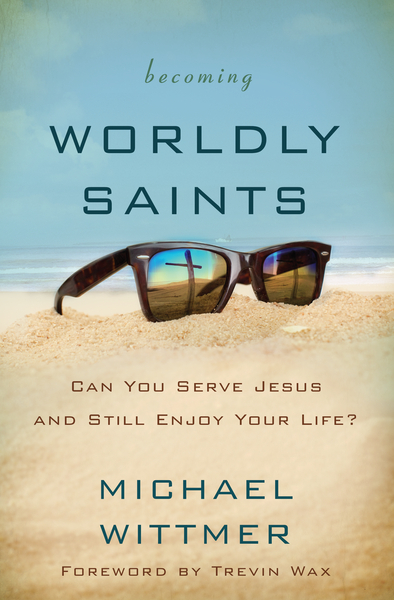 Becoming Worldly Saints: Can You Serve Jesus and Still Enjoy Your Life? Michael Wittmer (Zondervan) $15.99 Oh, wow, this is it. It is the long awaited sequel — or at least that’s how I see it — to his must-read, really great, gotta have Heaven Is a Place on Earth: Why Everything You Do Matters to God (Zondervan; $16.99.) That book frames all of earthy life and all our various callings and responsibilities in light of the over-arching drama of the Bible, which is to say creation/fall/redemption/restoration. God made the world really good, it got messed up really badly, Christ’s redemption really is cosmic in scope (“far as the curse is found” as the carol puts it) and the promised restoration really is a-coming. God is making “all things renewed” and we’re a part of His healing hope, the Kingdom, “on earth as it is in heaven.” Yes, Heaven Is a Place on Earth is a fine, accessible, very valuable book about this whole Kingdom vision thing. (You bet we’ll be talking about it at the Jubilee conference next week, whose 2015 slogan is “this changes everything.”)
Becoming Worldly Saints: Can You Serve Jesus and Still Enjoy Your Life? Michael Wittmer (Zondervan) $15.99 Oh, wow, this is it. It is the long awaited sequel — or at least that’s how I see it — to his must-read, really great, gotta have Heaven Is a Place on Earth: Why Everything You Do Matters to God (Zondervan; $16.99.) That book frames all of earthy life and all our various callings and responsibilities in light of the over-arching drama of the Bible, which is to say creation/fall/redemption/restoration. God made the world really good, it got messed up really badly, Christ’s redemption really is cosmic in scope (“far as the curse is found” as the carol puts it) and the promised restoration really is a-coming. God is making “all things renewed” and we’re a part of His healing hope, the Kingdom, “on earth as it is in heaven.” Yes, Heaven Is a Place on Earth is a fine, accessible, very valuable book about this whole Kingdom vision thing. (You bet we’ll be talking about it at the Jubilee conference next week, whose 2015 slogan is “this changes everything.”)
So, this new book — Becoming Worldly Saints — carries out that theme, helping us live it, day by day, inviting us to live with joy, free from guilt, embracing the not-yet-redeemed world. It is warm and Biblically-rich, and even clever at times. (So much so, that Al Wolters, author of the seminal Creation Regained — a heck of a nice guy, but not really known as a comic — says of Wittmer’s book “It made me laugh right out loud. This is popular theology at its best.”) Now that’s a back cover blurb for some of us, at least: it made Al Wolter’s laugh!
Wittmer, as the ad about it says, “brings your human and Christian lives together.” Well, he’d insist they are one in the same, anyway: “when you grasp God’s story, you’ll understand that not only is it possible to serve Jesus and still enjoy your life, but it’s the only way you really can.” I’m telling you, this is a very good book.
I wonder if this book was written somewhat inspired by some of the over-the-top and rather fashionable calls to commitment these days (Radical, perhaps?) Trevin Wax, in a good foreword, writes,
Becoming Worldly Saints conveys truths that are essential for following Christ faithfully. Mike Wittmer doesn’t want us to lose sight of the world-affirming aspects of our Christian faith. He doesn’t want us to underestimate the power of living an ordinary life of faithful devotion to King Jesus. he doesn’t want us to feel false guilt for enjoying the good world God has given us. The truth of eternity doesn’t obliterate our earthly experiences; it infuses them with heavenly significance.
Agree or not with all the details, this new Wittmer paperback is a fantastic example of what we’re about here at the bookstore. We think books like this can be truly transforming, can be helpful to those who don’t quite have an integrated, wholistic view of faith and the everyday. There isn’t much mystical or odd here, just good common sense, radically Biblical sense, about God’s good world and Christ’s redemptive plan of bringing healing and hope to it. N.T. Wright’s most recent book is right when it says the Biblical message is Simply Good News and then goes on to say Why It is News and What is Good About It.” This vision of being surprised by Kingdom hope informs Wittmer, making this a lively, substantive book, but also a true delight, helpful and wise. There is a great study guide in the back, making it ideal for book clubs, Bible studies, or adult Sunday school classes. Hooray!
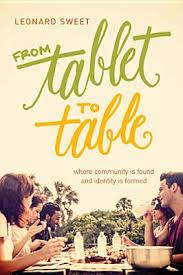 From Tablet to Table: Where Community Is Found and Identity is Formed Leonard Sweet (NavPress) $14.99 Wow, this is a fantastic little book, doing all the things that Sweet at his best always does — lots of word play, clever sentences, bringing together various insights in surprising ways. He is breathy, upbeat, energetic, confident that he’s got something that can change the world. I love authors like this, who believe in what they are saying, and put themselves into it. Sweet is — postmodern semiotic scholar that he is — it seems to me, at heart, still a holiness preacher. (The book is dedicated to his friends Bill and Gloria Gaither!) He reads The New York Review of Books and names all kinds of innovative technologies and futuristic potentials — for a while he branded himself as a futurist and consultant helping us “dance the soul salsa” in the “soul tsunami” of the hot-wired 21st century. The books that are coming out now by any number of young bucks telling churches how to have a better engagement with social media, are merely making practical what Sweet has been saying for decades, now. He’s sophisticated in his reading and, as I always say, the footnotes themselves are an education worth the price of the book.
From Tablet to Table: Where Community Is Found and Identity is Formed Leonard Sweet (NavPress) $14.99 Wow, this is a fantastic little book, doing all the things that Sweet at his best always does — lots of word play, clever sentences, bringing together various insights in surprising ways. He is breathy, upbeat, energetic, confident that he’s got something that can change the world. I love authors like this, who believe in what they are saying, and put themselves into it. Sweet is — postmodern semiotic scholar that he is — it seems to me, at heart, still a holiness preacher. (The book is dedicated to his friends Bill and Gloria Gaither!) He reads The New York Review of Books and names all kinds of innovative technologies and futuristic potentials — for a while he branded himself as a futurist and consultant helping us “dance the soul salsa” in the “soul tsunami” of the hot-wired 21st century. The books that are coming out now by any number of young bucks telling churches how to have a better engagement with social media, are merely making practical what Sweet has been saying for decades, now. He’s sophisticated in his reading and, as I always say, the footnotes themselves are an education worth the price of the book.
So, Sweet’s a bit of a super-techie, hip futurist, and he’s a holiness preacher wanting to bring Christ’s grace into everything. In recent years (and this isn’t surprising, really, if you know him) he has been writing about play (see The Well Played Life, for instance, a fun book I reviewed a while back) and even in a recent book on preaching with a foreboding title (GIving Blood) he reminds us to have great joy in our efforts to communicate the gospel well. Even the title of his new book on social ethics has a playful zest to it — From Me to We. Sweet’s a man alive, and there is no doubt about that.
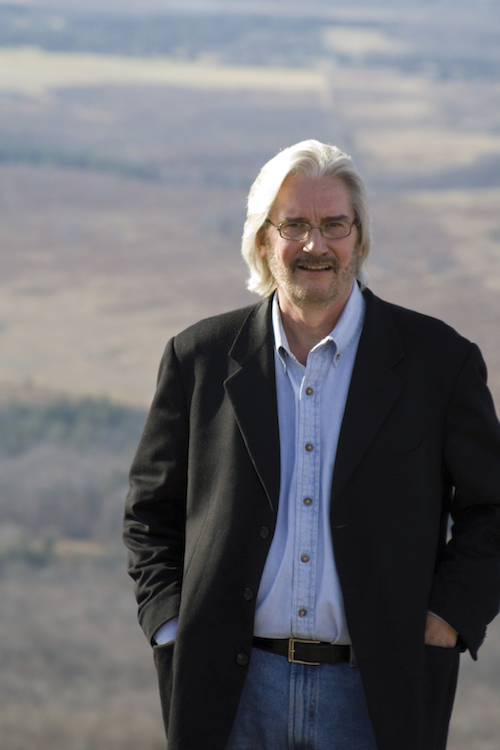
So where does he get it? What does he propose in the midst of this fast-paced, digital culture of ours, to find the simple joys of daily life. How do we do what these books above say — live life with happy gusto, in and for the world God so loves? Does he have a proposal or agenda, plans, even, for helping us live into this great and blessed story we’ve mentioned in the books listed above? Can we receive God’s best gifts with great joy? How?
Well, I’d be wrong to say “it is simple” but this book almost makes it sound that way. He makes the case — and has amazing statistics to prove it (of course he does; where does he find this stuff?) — that the simple act of eating together around tables in families is a major indicator of all manner of success in life. The capacity to thrive — to have a well-played life, to understand “pure pleasure” — comes from good relationships that are formed by eating together. Eating together at table.
Can a meal change your life?
Yes, says, Sweet. And the Bible seems to say, so, too.
“The story of God is full of references to food. From the Garden of Eden to the Last Supper to the wedding feast of the Lamb, God sets a table before us and invites us to join Him there.” In a way From Tablet to Table is a Biblical study of food, but also of meals and tables.
What happens when we “consume fast food in front of our smart phones”? Do we engage in mealtimes, and other practices, where we sadly “never face each other, barely acknowledging the existence of one another. We consume bite-size Scriptures and reduce our world so that we can move through it quickly without being distracted by the activities that surround us.”
This is a book about paying attention, about paying attention to food and meals and each other. And to our own place, our neighborhoods. But to do that, we have to, in some ways, put down our ipads and tablets; that is, our fascination with technology. Ahh, the ironies here, of Sweet of all people telling us this! But he has always had a green thumb, interested in quality stuff that tells real stories and a spirituality of joyful appreciation of the stuff of earth. There is a bit of an irony here since he is certainly no Luddite, but here he does warn us of “tabletizing” things, and, after repenting of that, how to “table-ize” things. Yep, he says that.
Sweet tells a story early in the book that, I gather, propelled him further to write this particular book, and it certainly propelled me to keep reading. He noted that a young fellow, a friend of his daughter, was staying over at their home for a few days. The kid seemed a bit awkward, maybe even a uncomfortable, and Sweet asked his daughter about it.
“Was it something we did?” he asked.
“Sort of,” Soren answered. “He said that he has never eaten with his family at a table, and so he wasn’t sure how to act of what to do.”
Wow.
“A Christian teenager, attending a Christian college, had never eaten a home cooked meal at a family table.” Interestingly, he notes how shows such as Modern Family rarely show families actually eating together (although, he notes, a show called Blue Bloods does.) We are in a bit of a cultural crisis here. The implications — on physical health, on social bonding, or cultural capital — are serious. The research shows that the more we eat out, and the less real meals we prepare at home, the worse off we are.
And Jesus comes along and invites us to table.
And that, Sweet shows, shapes our identity.
This book is just loaded (or should I use a more foody type word, laden?) with great phrases (he talks about the power of story, and invites us to combine narratives and metaphors into narraphors) and colorful paragraphs, flowing into vital ideas to inspire us. For instance, he writes,
The Kingdom of God is not a geographic domain with set boundaries and settled decrees, but a set of relationships in which Christ is sovereign. At the table, Jesus moves us from ideas about life and love to actual living and loving.
Martin Luther was right. Theology is table talk.
This is all in the first three chapters, the first half which he calls “Table It.”
The second half is comprised of three more chapters, entitled “Life’s Three Tables.” Here he explores the implications of a table theology and table ethics and “dining demeanor” at home, at church, and in the world.
He invites us to “set the table” in these areas, and gives us stories of what it might look like. It isn’t a heavy study full of vast details (like, say, Slow Church: Cultivating Community in the Patient Way of Jesus by Christopher Smith and John Pattison which is truly a must-read if you have any interest in the intersection of food and church.) But From Tablet to Table: Where Community Is Found and Identity Is Formed is an extrapolation of a sermon, and we thing it is well worth reading, maybe with others, hopefully around a table, together.
Here is a brief interview with Sweet by Jonathan Merritt. Check out the video at the bottom, a 20- minute talk which shares some of his ideas and ways with words.
“Len Sweet is singing a song I love, and he’s doing it with intelligence and passion.”
Shauna Niequist, author of Bread & Wine: A Love Letter to Life Around the Table, with Recipes
“With his reflections on the Lord’s table and the dinner table as central for Life and life, Len Sweet draws together heaven and earth in a celebration of the ongoing relationships of love. This is a splendid theology to live by.”
Luci Shaw, poet, author of Adventure of Ascent: Field Notes from a Lifelong Journey




Want
to enjoy life more? Read some of these books that authorize us to do
all things with and for God, taking delight in the goodness of the good
creation. But learn to practice it, embody it, do it. Walk that talk —
have fun. And that means moving from our tablets a bit, to our tables.
Sweet can help you set the table. Offer hospitality, be friendly, eat
well, throw parties.
BookNotes
DISCOUNT
ANY ITEM MENTIONED
20% off
order here
takes you to the secure Hearts & Minds order form page
just tell us what you want
inquire here
if you have questions or need more information
just ask us what you want to know
Hearts & Minds 234 East Main Street Dallastown, PA 17313 717-246-3333
